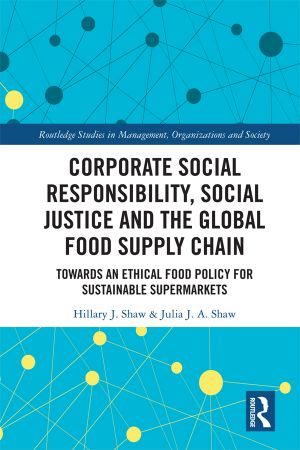Corporate Social Responsibility, Social Justice and the Global Food Supply Chain

- Authors
- Shaw, Hillary J. & Shaw, Julia J.A.
- Publisher
- Routledge
- Date
- 2018-05-31T00:00:00+00:00
- Size
- 2.38 MB
- Lang
- en
The modern food system has become hyper-efficient at producing large quantities of cheap food. Food chains, from farmer to consumer, have become increasingly dominated by supermarket oligopolies in both developing and developed countries. The economic power these supermarkets have derived from globalisation and economies of scale has been relentlessly focussed both upwards and downwards along the food chain, as well as sideways towards agencies of national and local governance. Consumers may enjoy cheaper meals but the food system is neither healthy nor sustainable. Obesity is already high in many countries and rising in the developing world, and global food chains remain hostage to many environmental threats, ranging from depletion of non-renewable resources such as water and oil to issues of pollution and loss of biodiversity.
Utilising the framework of the Quadruple Bottom Line, and by gathering empirical evidence from a range of organisations - including governmental agencies, NGOs and charities, trade unions, retailers and retailing associations - *Future Food Philosophies* will identify where gaps in CSR initiatives exist and whether these lacunae could best be filled by 'soft law' (CSR) or 'hard law' (legislation).
* * *
** Future Food Philosophies will initially provide an overview of the extent to which supermarkets have become the most powerful players in the global food chain, and to what degree their CSR rhetoric attempts to address social and environmental issues arising from their operations in the developing and developed world. It will then elucidate a set of ethical theories and philosophies of CSR and explore the relationship between CSR and legislation, between soft and hard law; examining questions such as 'why should supermarkets be socially-responsible?' The authors will then examine empirical evidence as to what CSR initiatives exist now, how effective are they, and what further CSR programmes or even regulatory innovations would be required for a sustainable food system.
** Future Food Philosophies engages with a variety of disciplines, including, law, economics, management, marketing, retailing, politics, sociology, psychology, diet and nutrition, consumer behaviour, environmental studies and geography. It will be of interest to both practitioners and academics, including postgraduate students, social scientists and policy-makers.